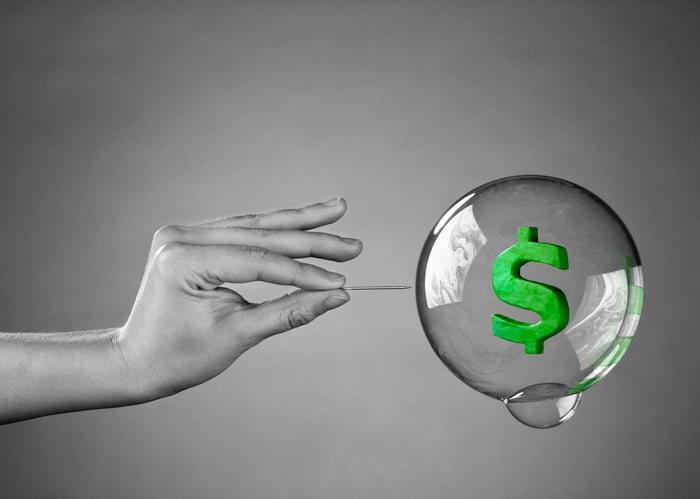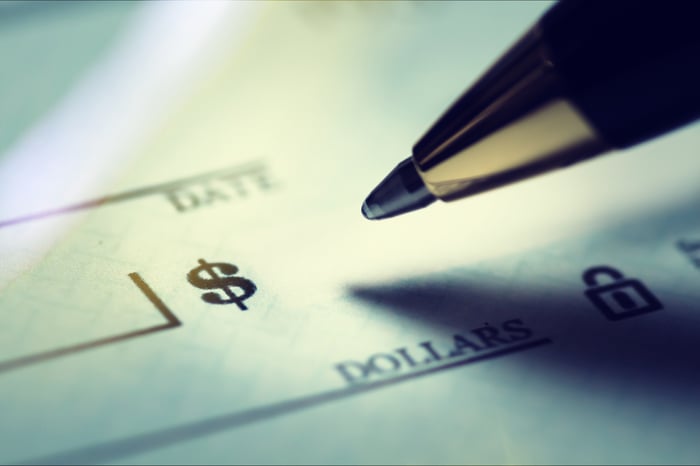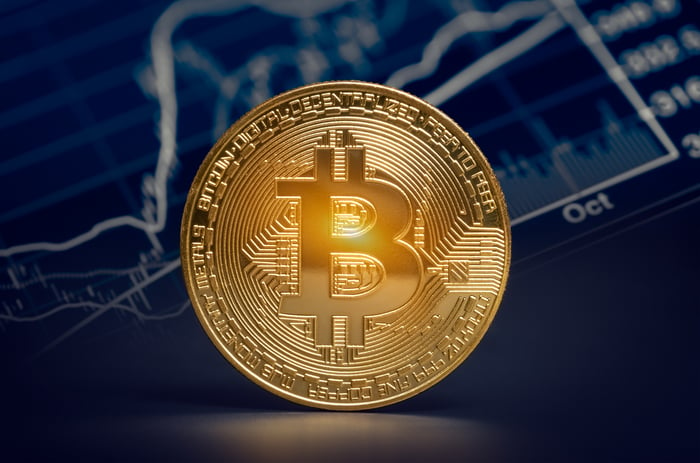Although stock market volatility is always present, this year has truly been something else. We've watched the benchmark S&P 500 lose over a third of its value in about a month, as well as recoup everything that was lost in under five months. That's roughly a decade's worth of price swings crammed into half a year.
But just as investors overreacted to the downside in March on coronavirus disease 2019 (COVID-19) pandemic concerns, they now appear to be showing signs of overzealousness to the upside. Even though U.S. economic activity is nowhere near its pre-COVID-19 levels, the stock market is hitting new highs, and stocks within select industries are piling up triple-digit year-to-date gains.
No matter how well or poorly the stock market is performing, there always seems to be at least one potential bubble waiting to burst. But with exuberance in full force following positive COVID-19 vaccine data, I see three dangerous bubbles waiting to collapse.

Image source: Getty Images.
Electric vehicles
One industry within the stock market that's exhibiting exceptionally high levels of irrational exuberance is electric vehicles, or EVs.
The thesis behind buying EV stocks is simple to understand, and it generally makes sense. With most developed countries focused on reducing their carbon footprint, EVs have become the future for the auto industry. It's not a matter of if EVs will take over our highways, but simply a matter of when that might happen. This is why we've seen auto stocks like Tesla (TSLA 4.96%) and NIO (NIO -0.48%) rocket into the stratosphere. Shares of Tesla are up almost 590% on a year-to-date basis, through Nov. 26, while NIO has gained a not-too-shabby 1,240%.
I have little doubt that Tesla and NIO are going to be able to expand their production and see their sales head higher. But sporting valuations of $544 billion for Tesla and $73 billion for China's NIO makes little sense considering that neither company has shown the ability to generate a recurring profit, based on generally accepted accounting principles (GAAP). Tesla's valuation is especially egregious when you realize that the only reason it's been able to generate a profit in recent quarters is because it's been selling emission credits to other automakers.
At $544 billion, Tesla's market cap is higher than General Motors (GM 1.20%), Ford, Toyota, Volkswagen, Honda Motor, Nissan Motor, Ferrari, and Fiat Chrysler combined, yet it'll only produce 500,000 EVs this year! Meanwhile, NIO's market cap is higher than General Motors, despite NIO only delivering roughly 22,500 premium EV SUVs over the past six months. None of this makes sense.
Just like any next-big-thing investment, EV manufacturers are likely to face production expansion hurdles and competitive concerns as every auto company under the sun tries to get its foot in the door.
EV stocks can be long-term winners for investors, but not before reality kicks in and the bubble bursts on these absurd valuations.

Image source: Getty Images.
SPACs
Another potentially dangerous bubble that's brewing is special purpose acquisition companies, or SPACs. A SPAC is essentially a blank-check company. It goes the traditional initial public offering (IPO) route to raise capital, then seeks to make acquisitions that'll grow in value. In other words, investors are handing over their capital and entrusting that the management team of a SPAC will make a smart acquisition to increase the value of their investment.
As of mid-October, The Wall Street Journal reported that 143 SPACs had IPO'd on a year-to-date basis, with the average SPAC outperforming the broad-based S&P 500 by nearly a factor of four (35% versus 9%). With historically low lending rates and the prospect of a divided Congress likely to send the broader market higher with Joe Biden in the White House, investors have been more than willing to jump aboard the SPAC train.
However, the euphoria surrounding SPACs might be misplaced. As is often the case, SPACs are lacking in information. Investors often have no clue what the directors intend to invest in, or when they'll consider making an acquisition. When an acquisition is announced, short-term traders and emotional investors often drive the valuation of a SPAC into the stratosphere.
In addition to blindly throwing money at the wall and hoping it sticks, SPAC directors don't always acquire quality businesses. While the acquisition of EV maker Nikola (NKLA -3.23%) by blank check company VectoIQ Acquisition can arguably be considered a success (shares have tripled since the beginning of March), it could just as easily be viewed as a failure. After all, Nikola has failed to finalize a partnership with General Motors (at the time of this writing), is being probed for fraud by the Securities and Exchange Commission, and has seen its founder Trevor Milton step down from his role as Executive Chairman of the board via a late-night tweet.
My suspicion is SPAC euphoria is going to produce far more losers than winners.

Image source: Getty Images.
Cryptocurrency
Finally, we have cryptocurrencies, which are once again vaulting into nosebleed territory without any fundamental reason or purpose.
Since the year began, the big three of crypto -- bitcoin, Ethereum, and Ripple -- have gained 152%, 321%, and 216%, respectively. While it is possible that digital payments are surging because of concerns about using physical cash during a pandemic, it's far more likely that the monster rally in cryptocurrencies is associated with short-term-focused and emotion-driven traders.
One of the biggest issues with cryptocurrency is that if often lacks utility. Most digital tokens are tethered to their underlying blockchain, and very few businesses are willing to accept digital tokens as a form of payment.
Take bitcoin and its total market value of $337 billion. With approximately 40% of bitcoin's circulating supply held by investors who have zero desire to put these tokens back into circulation, it means there's only about $200 billion in bitcoin tokens that can be used for day-to-day transactions. This $200 billion might sound like a lot, but it doesn't even account for 0.25% of global gross domestic product. Based on utility, there's not a pathway to broad-based crypto adoption.
Another concern is that crypto investors are placing their hope in digital tokens when it's actually the underlying blockchain technology that holds the real potential. Brand-name businesses are developing blockchain solutions of their own, some of which may be able to operate without a token, or perhaps with fiat currency.
The point is, a convincing case hasn't been made that world even needs digital tokens like bitcoin or Ripple. We've watched sentiment-driven cryptocurrencies implode before, and we'll almost certainly see it happen again.





